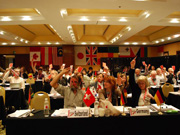News
UNI MEI vows to change rules of game in media,entertainment sectors

In the face of a global economic crisis, budget cuts affecting jobs across the culture, media and entertainment industries, attacks on working conditions and threats to the right to collective bargaining, delegates vowed to build and organise stronger unions on the opening day of the UNI-MEI Congress in Mexico City.
Delegates pledged to fight:
· To educate, campaign and lobby to change the culture around intellectual property rights as part of a bid to make society value the work of creators
· To tackle the growth of precarious employment, gender inequalities and to secure jobs with justice
· To ensure that technological change is not used to enable outsourcing and cheaper, lower-quality production but to improve skills and deliver better working conditions and higher quality
· To defend freedom of association, the right to organise and collective agreements - which are increasingly under attack - and to raise a voice in government and international institutions
· To demand sustainable funding for public service broadcasting, film and live performance as part of a strong defence of pluralism and freedom of expression.
Following an opening address from Mexican Labour Minister Javier Lozano Alarcon, UNI General Secretary Philip Jennings rallied delegates behind the demands for change, saying: “There is a global onslaught on jobs, unions and what we stand for – justice, decent working conditions, rights.
“We have no alternative but to organise to fight back, to change the rules of the game. That's what our Breaking Through campaign is about. It is where we defend cultural diversity, pluralism, freedom of expression and democratic choice. This is a battle of ideas – about the future shape of the economy, our societies and how the wealth we create is to be distributed. We have to win”.
The urgent need for change was reinforced by successive speakers from across the world.
Patricio Flores Sandoval, General Secretary of Mexican union SITATYR called for new technologies to be used to benefit workers and improve working conditions, not to undermine salaries and jobs. He said: “New technology is being used to outsource or cheapen production which is undermining jobs, fostering precarious employment without social security and denying opportunities to young people.
“We need to stand for decent salaries, fair treatment, dignity and technology being used for the benefit of workers not just employers”.
Benoit Ginisty Executive Director of FIAPF said: “Too many politicians think a free internet means content must also be free. The consequence of that is less jobs, less growth, less taxes and less cultural expression. We need to change the common perception that intellectual property rights are an obstacle to growth and creativity. They are not – they are the foundation of our industry.”
Moving the resolution on intellectual property rights Martin Spence, Assistant General Secretary of UK-affiliate BECTU, made an impassioned plea to step up the fight against the internet pirates. He said: “There are those who use the language of human rights, anti-capitalism or civil liberties to justify downloading films for free. Their use of such language is bogus, an insult. Human rights is about child labour, slavery or women's rights. Not being able to download the latest Johnny Depp Pirates of the Caribbean film for free is not a denial of human rights.”
UNI-MEI President Heinrich Bleicher-Nagelsmann called for working people to be made the first priority, adding they should not be forced to pay for the economic crisis they did not create. He said strong, assertive trade unions were the best way to defend working people.
And Head of UNI MEI Johannes Studinger, setting out the enormous programme of work undertaken as part of the Breaking Through campaign, said: “We want society to recognise the value of what our members do. The idea is everything should be quicker, cheaper with less emphasis on quality and more on speed. Cultural budgets are often the first to be cut by governments.
“Our job is not just to protect content but to change the perception of our industry as one that must be valued as it plays a vital role in society.”
But even amid the economic gloom and attacks on public service broadcasting, jobs and working conditions there were signs of UNI unions achieving real change to benefit members.
Jennings reported that 43 global agreements had been signed, covering 10 million workers, and that there were new organising projects in 60 countries.
UNI-MEI's successes were underlined by delegates. Adriana Rosenzvaig of UNI Americas highlighted the recruitment of 1,200 new members in just one company in Colombia – one of the most dangerous countries in the world in which to be a trade unionist – following the signing of a global agreement with Carrefour.
Zakari Koudougou of UNI Africa exposed the pressure placed on media and cultural workers by politicians across the continent and the struggle for decent working conditions. But he said the need for strong unions had never been greater and there was a strong potential for growth, especially in South Africa and Nigeria.
UNI's first global agreements in Japan, Indonesia and Malaysia had been signed recently, the conference heard. And new agreements on social dialogue, in areas of live performance, gender equality agreements and improved training provision, had been achieved in parts of Europe despite the economic crisis and the massive haemorrhaging of jobs and attacks on terms and conditions.
In two unanimous votes delegates agreed to put union organising at the heart of their work and to seek to build both membership and activity.
Matt Loeb of IATSE also urged affiliates to develop their lobbying work to make sure there was a political price to pay for those politicians who failed to protect working conditions and stand up for justice.

